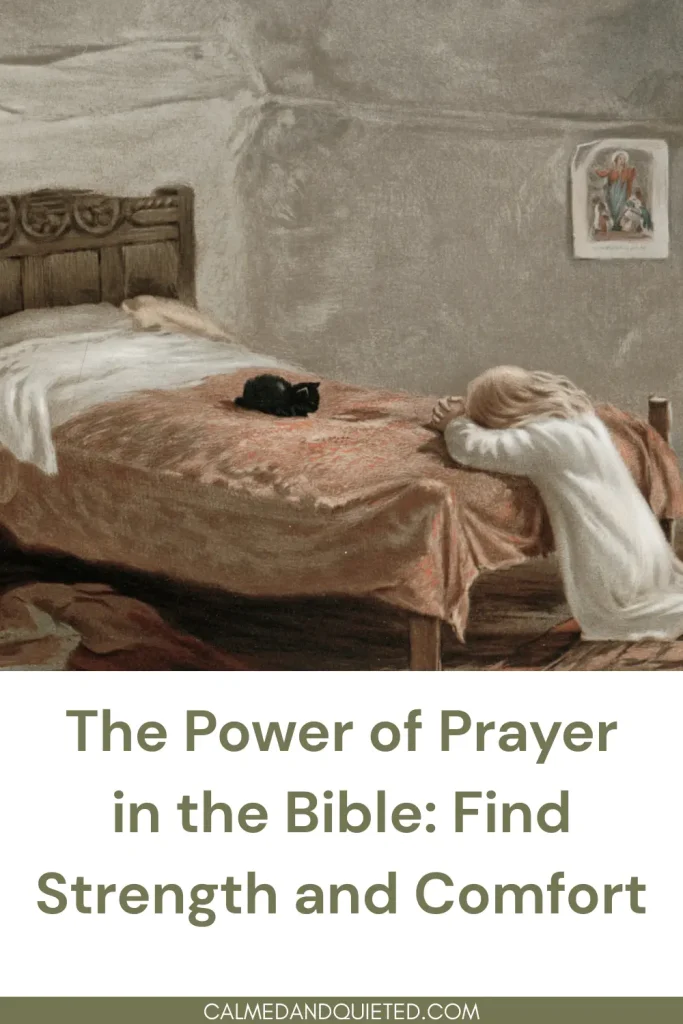
The Power of Prayer in the Bible: Find Strength and Comfort
Prayer is more than words spoken into the air; it is a divine connection to the power of God, capable of transforming lives and offering peace in life’s most turbulent moments. Through prayer, we step into the presence of the Lord Jesus, calling on the name of the Lord to guide, heal, and sustain us. The Bible, from the Old Testament to the teachings of Jesus’ disciples, reveals that prayer is not just a practice but a lifeline for God’s people.
When we embrace daily prayer, we cultivate an effective prayer life, aligning our hearts with the Word of God. Whether it’s a public prayer spoken in community, the quiet recitation of the Lord’s Prayer, or the heartfelt cry for daily bread, each moment spent in prayer brings us closer to the glory of God.
The stories of the Bible—from the withering of the fig tree to the calming of a wave of the sea—show us that faith-filled prayers hold great power. They remind us that through the blood of Jesus, we have access to God’s grace. As we face uncertainties, may our prayers today be marked by faith, trust, and the boldness to seek God’s will in Jesus’ name.
Understanding the Power of Prayer
Prayer is one of the most profound gifts God has given us. It’s not just a practice; it’s a lifeline to the Creator of the universe. Through prayer, we communicate directly with our heavenly Father, bringing our joys, fears, and needs before Him. But what makes prayer truly powerful? It’s the connection it fosters with the power of God, aligning our hearts with His purposes and reminding us that we are never alone in life’s challenges.
Prayer is a sacred moment where we set aside our own strength and lean fully on the grace of God. Through prayer, we speak to a loving Father who knows our hearts and hears our cries.
But why is prayer so powerful? Because it connects us to Christ Jesus, the only way to the throne of God. When we pray, we are not relying on our own words or wisdom but trusting in the power of the Holy Spirit to intercede for us. It’s in this divine exchange that we see the importance of prayer—it transforms, heals, and strengthens us.
Prayer is the bridge between our earthly struggles and the peace of God. Each prayer time, whether it’s a whisper in the dark or an earnest cry in difficult times, draws us closer to Him. It’s through these moments that our faith grows, as we see God’s help and His perfect will unfold in ways we couldn’t have imagined.
In the hardest seasons, prayer becomes the refuge where we find the peace of God. It reminds us that we don’t face storms alone. Whether we’re praying for family members or seeking God’s help in difficult circumstances, the presence of God meets us in the quiet.
Biblical Foundations of Prayer
From the earliest pages of the Old Testament to the teachings of Jesus’ disciples, the Bible paints a vivid picture of prayer’s importance. It’s in the stories of faithful men and women that we see how prayer can change circumstances and strengthen faith. By exploring the Word of God, we discover not only how to pray but why prayer is central to our relationship with Him.
Key Bible Verses That Reveal the Power of Prayer
The Holy Bible is filled with verses about the great power of prayer. James 5:16 reminds us, “The prayer of a righteous person has great power as it is working.” In Psalm 34:17, we read, “When the righteous cry for help, the Lord hears and delivers them out of all their troubles.” These scriptures show us that prayer is not empty words but a profound connection to the will of God.
Stories of Righteous Individuals Whose Prayers Changed Circumstances
Throughout the Bible, we encounter powerful examples of how the prayers of a righteous person can alter circumstances in extraordinary ways. Take Elijah, for instance. His fervent prayers didn’t just stop the rain for three and a half years—they demonstrated the power of God in a way that turned a nation’s heart back to Him. Elijah’s trust in the will of God allowed him to pray with boldness and faith, knowing that God’s timing and purposes were perfect.
Then there’s Hannah, a woman whose deep sorrow drove her to the temple to pour out her heart before the Lord. Her prayer of faith, spoken in anguish but with unwavering trust, led to the miraculous birth of Samuel, who would become one of Israel’s greatest prophets. Hannah’s story teaches us that even in our lowest moments, God hears the cries of the righteous and answers in ways that far exceed our expectations.
These accounts, and many others throughout Scripture, illustrate that prayer is not a passive act but a catalyst for God’s work in the world. They remind us that when we bring our needs, hopes, and struggles to Him in prayer, we open the door for His glory to be revealed, even in the most challenging circumstances.
How Jesus Modeled Prayer for His Followers
Jesus Christ didn’t just teach about prayer—He embodied it, showing His followers that prayer is central to a life lived in communion with the heavenly Father. From the beginning of His ministry to His final moments on the cross, Jesus prayed with purpose and consistency, leaving us a clear model to follow.
In moments of solitude, such as when He withdrew to desolate places to pray, Jesus demonstrated the importance of prioritizing quiet time with God. These times of prayer were not mere routine; they were lifelines that sustained Him, aligning Him with the perfect will of the Father. Even in the Garden of Gethsemane, when faced with unimaginable anguish, Jesus’ prayer was one of surrender: “Not my will, but Yours be done.”
Publicly, Jesus offered prayers that revealed His deep connection with God and His compassion for others. Whether giving thanks before feeding the five thousand or interceding for the crowds at Lazarus’s tomb, His prayers served to glorify the name of the Lord and point people to the power of God.
His teachings on prayer, including the Lord’s Prayer, gave His disciples and all of us a framework for approaching God with reverence, humility, and trust. Through Jesus’ example, we learn to seek God’s guidance in all things, to pray with faith and expectancy, and to align our hearts with the glory of God.
The Connection Between Prayer and God’s Power
Prayer isn’t about bending God’s will to match ours; it’s about surrendering to His greater plan. When we pray, we tap into the limitless power of God, finding strength and clarity that surpasses human understanding. This connection transforms our hearts and minds, enabling us to trust in the glory of God even in the face of uncertainty.
When we pray, we submit our desires to the will of God. It’s not about bending His plan to fit ours but allowing His perfect will to guide us. Prayer reshapes our hearts, aligning them with the ways prayer can transform our perspective and priorities.
The Transformative Power of Prayers Rooted in Faith
A prayer of faith goes beyond routine words or rituals—it is an intimate act of trust in the goodness and sovereignty of God. This kind of prayer doesn’t rely on eloquence or the length of our petitions. Instead, it’s about the posture of our hearts as we approach our heavenly Father with confidence that He hears us. When we pray with faith, we open ourselves to the power of the Holy Spirit, who works in ways that often surpass our understanding.
Consider the story of the bleeding woman in the New Testament who reached out to touch the hem of Jesus’ garment. Her faith wasn’t in her own strength but in the healing power of Christ. Similarly, when our prayers are rooted in faith, we align with the will of God, allowing His transformative work to flow through us. This doesn’t always mean receiving the answers we expect, but it does mean witnessing the glory of God in ways that build our trust and deepen our connection to Him.
Why Trusting in God During Prayer Brings Peace
Trusting God during prayer is an act of surrender, a decision to release control and rest in the assurance of His love. It’s not about perfect words or demanding outcomes but about resting in the truth that He is working all things together for good. This trust doesn’t remove life’s challenges, but it reframes them, allowing us to experience the peace of God, which the Bible describes as surpassing all understanding (Philippians 4:7).
When we trust God, prayer becomes less about finding immediate solutions and more about finding His presence. There’s a profound comfort in knowing that even when we don’t have the answers, He does. It’s the kind of peace that allows us to stand firm in the face of uncertainty, to let go of worry, and to embrace the mystery of His perfect will. Trusting God doesn’t mean we stop asking or hoping—it means we rest, knowing He holds everything in His hands, including us.
Types of Prayers in the Bible
The Bible reveals that prayer is as varied as the lives of God’s people. From prayers of adoration that exalt the name of the Lord, to prayers of confession that bring us back into fellowship with Him, each type serves a unique purpose. Understanding these prayers helps us deepen our own effective prayer life and strengthens our faith journey.
Prayers of Adoration: Acknowledging the Greatness of God
Adoration is about honoring God for who He is. It’s the moment we lift our eyes to His glory and say, “O God, You are holy and mighty.”
Prayers of Confession: Seeking Forgiveness and Restoration
Confession brings us closer to God’s grace, as we lay down our sins and turn from our wicked ways. These prayers cleanse our hearts and restore our relationship with our loving Father.
Prayers of Thanksgiving: Expressing Gratitude for God’s Blessings
Thanksgiving shifts our focus from what we lack to what we’ve received. It reminds us of God’s provision, His deep love, and the good things He has done.
Prayers of Supplication: Bringing Needs and Requests to God
Supplication invites us to share our burdens with God, trusting Him to provide in His perfect timing.
If you’ve been longing to deepen your walk with God but don’t know where to start, you’ll love How to Get Closer to God: A Step-by-Step Biblical Guide. It offers gentle practices and Scripture-based rhythms to nurture intimacy with Him in everyday life.
Finding Strength Through Prayer
Life’s challenges often leave us feeling overwhelmed and weary. Yet, prayer offers a refuge—a place to exchange our burdens for God’s strength. Whether it’s through the quiet whispers of our hearts or the bold cries of a prayer of faith, we find renewal and resilience by seeking the presence of the Lord Jesus.
How Prayer Provides Strength During Life’s Challenges
Prayer is often the anchor we cling to when life feels overwhelming. It’s not about escaping life’s storms or pretending they don’t exist. Instead, it’s about finding the strength and courage to stand firm in the middle of them. Through prayer, we connect with the power of God, drawing on His strength when our own fails. It’s a reminder that we don’t have to face life’s challenges alone because God’s help is always available, no matter how heavy the burden feels.
I remember a season when I faced an unexpected health issue. The uncertainty was daunting, and the decisions I had to make felt far beyond my ability. At first, I tried to manage it on my own, researching endlessly, making plans, and trying to control every detail. But it wasn’t enough. I was exhausted—physically, emotionally, spiritually.
Prayer is a refuge in times of uncertainty: my personal experience
One night, overwhelmed by it all, I knelt by my bed and prayed with a raw honesty I hadn’t allowed myself before. “Lord, I can’t do this alone. Please help me.” In that moment, I felt a quiet peace, a reassurance that He was with me, guiding every step. The situation didn’t resolve immediately, but prayer became my constant source of strength. Each day, I would lay my worries at His feet, trusting in His presence and His plan.
Through that experience, I learned that prayer doesn’t always change our circumstances, but it changes us. It shifts our perspective, reminds us of His deep love, and equips us to move forward, even when the path ahead feels uncertain. In life’s challenges, prayer becomes not just a practice but a lifeline—a connection to the Lord Jesus, who walks with us through every storm.
Think of Daniel praying in the lion’s den or the mother of Jesus trusting God’s plan for her Son. These stories remind us that prayer is a refuge when life feels uncertain.
Finding Comfort in God Through Prayer
In moments of anxiety and sorrow, prayer reminds us that we are not abandoned. It’s in these intimate conversations with our loving Father that we experience His peace and care. By turning to Him in prayer, we discover comfort that surpasses human understanding, rooted in His unchanging love.
How Prayer Brings Peace to Anxious Hearts
Anxiety can feel like a storm raging within—restless thoughts, unsettled emotions, and a constant sense of unease. In those moments, prayer becomes a sacred refuge, a place where we can bring every worry, fear, and doubt to our heavenly Father. When we pour out our hearts to Him, we are reminded that He not only listens but cares deeply about what burdens us.
This act of surrender through prayer shifts the weight off our shoulders and onto His. It allows His peace to settle over us, a peace that doesn’t always come with immediate answers but calms the turmoil in our hearts. I’ve experienced this firsthand during sleepless nights when my mind wouldn’t stop spinning. As I whispered my fears to God in the stillness, I felt His reassurance, not through a dramatic sign, but through a steady, quiet confidence that I wasn’t alone.
Prayer doesn’t magically erase the challenges we face, but it quiets the storm inside, reminding us that God’s love and care are constant, even when life feels overwhelming.
The Promise of God’s Presence When We Call on Him
One of the most profound assurances in the Word of God is His promise to be near when we call on Him. Psalm 145:18 declares, “The Lord is near to all who call on Him, to all who call on Him in truth.” This promise isn’t conditional on our perfection or eloquence—it’s grounded in His faithfulness and deep love for His children.
In our darkest hours, when the weight of life feels unbearable, God’s presence becomes the light that guides us through. His nearness doesn’t always change our circumstances immediately, but it changes us. It gives us courage to take the next step, even when the path ahead is unclear.
I think back to a time when I felt completely lost—a season of disappointment where nothing seemed to go as planned. In prayer, I found not only the strength to move forward but also the unmistakable comfort of God’s presence. It was like stepping into a warm, quiet space after being battered by cold winds.
When we pray, we are not speaking into the void. We are entering the only place where we can fully rest in the knowledge that God is with us, sustaining us through His grace and power. It’s His presence, constant and unwavering, that carries us through even the darkest valleys.
Practical Tips for a Stronger Prayer Life
A rich prayer life doesn’t happen overnight; it’s cultivated through intentionality and consistency. Whether it’s setting aside time each day, using Scripture as a guide, or simply seeking the quiet presence of the Holy Spirit, there are countless ways to deepen your connection with God. These practical steps can help you build a habit of prayer that sustains and strengthens you through all seasons.
Create a Routine
Building a rich prayer life begins with making prayer a consistent part of your day. Starting your morning with dedicated prayer times sets the tone for the hours ahead, anchoring you in God’s presence before the demands of life take over. This doesn’t have to be complicated—a few minutes of quiet reflection, a heartfelt conversation with the Holy Spirit, or journaling your prayers can become a meaningful routine.
For some, mornings might not be ideal. If your schedule feels packed, consider carving out time during your lunch break or before bed. The key is to find a rhythm that works for you. Over time, this practice becomes not just a habit but a cherished part of your day—an opportunity to connect with your heavenly Father amid life’s busyness.
Use the Bible
Praying through Scripture is a transformative way to align your heart with the will of God. The Bible is filled with prayers, promises, and truths that guide and shape our conversations with Him. For example, you might meditate on a passage like Psalm 23, letting its words inspire your prayer for guidance and peace.
Scripture also helps us pray beyond our immediate concerns. By reflecting on the Word of God, we can intercede for others, praise His greatness, and seek His direction. Whether it’s using the Psalms to express your emotions or the Lord’s Prayer as a foundation for your requests, incorporating the Bible into your prayer life deepens your understanding of His character and His plan
Stay Consistent
Consistency is essential for cultivating a prayer life that sustains you through all seasons. Like any meaningful relationship, your connection with God grows stronger when nurtured regularly. This doesn’t mean perfection—it’s okay to miss a day or feel distracted sometimes. What matters is coming back, again and again, with a heart open to His presence.
A consistent prayer habit strengthens your faith, reminding you of God’s unchanging love and care. It also builds trust, as you see His answers unfold in His timing. Whether you’re facing difficult circumstances or celebrating life’s joys, consistency keeps your focus on the One who is always faithful. Over time, these daily moments with God become a source of strength, peace, and clarity that anchor your entire faith journey.
Embracing the Power of Prayer
Prayer is more than a practice—it’s a lifeline. It’s how we connect with our Creator, find strength in Christ Jesus, and experience the peace of God. No matter where you are in your faith journey, know that the power of prayer is always within reach. So, take a moment, lift your heart to Him, and discover the comfort and strength that only He can give.
PIN ME FOR LATER!

How has prayer shaped your faith journey? Do you have a favorite routine, Scripture, or experience that has deepened your connection with God? I’d love to hear your thoughts and stories—share them in the comments below!




